Working Environment

Glory respects every employee as an individual and strives to create an enriching, pleasant working environment.
Work-Life Balance
Glory has in place numerous initiatives for promoting a work-life balance. These initiatives enable employees to match their job and work schedule to their lifestyle while maximizing their abilities and career potential.
Supporting Flexible Woring
Glory promotes flextime and teleworking to support employees’ flexible working with no location or time constraints. In recent years, we have implemented a work-from-home system mainly for office workers, while promoting mobile work options for field workers.
Ratio of days taken paid leave
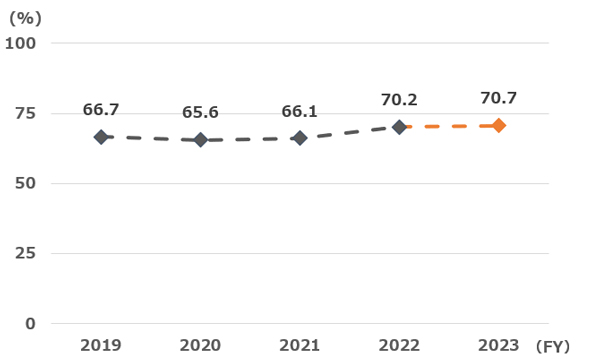
Work-Life Balance Support Systems
Balancing Work and Parenthood

G Kids Home
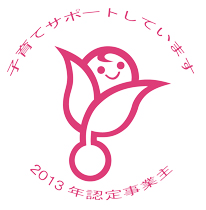
"Kurumin" mark
Employees can take advantage of systems that allow them to place equal importance on raising children and carrying out their jobs.
An in-house daycare center called "G Kids Home" is opened for children of full-time employees. The center caters for children aged from 57 days up to the age at which they enter elementary school. The company also has provided subsidies to hire childcare services for parents working full-time at Glory sites other than the head office and have children who are in the third grade of elementary school.
Moreover, the shortened working hours system has been enhanced to expanded in terms of eligibility so that working parents can take advantage of it until the end of child’s third grade in elementary school and use it for a short-term or re-apply. These measures allow employees to both develop their careers and raise children.
In fiscal 2013, Glory was recognized for promoting measures based on the Act on the Advancement of Measures for Supporting the Development of the Next Generation by the Minister of Health, Labour and Welfare, and received the Kurumin Mark.
We set a new target from April 1, 2021 to March 31, 2026, and are consistently providing support for balancing work and parenthood.
1. Planning period
Five years from April 1, 2021 to March 31, 2026
2. Our challenges
The ratio of male employees taking childcare leave is low in comparison to female employees
3. Targets, initiatives, and timing of implementation
〈Target〉 Increase the ratio of males taking childcare leave to at least 30% by 2025
·Consider revising and implementing systems to make it easier for not only females, but also males to use the childcare leave system
·Implement educational activities in order to encourage usage of the childcare leave system
Number of Employees Taking Childcare Leave and Ratio of employees Who Returned to Work after Taking Childcare Leave
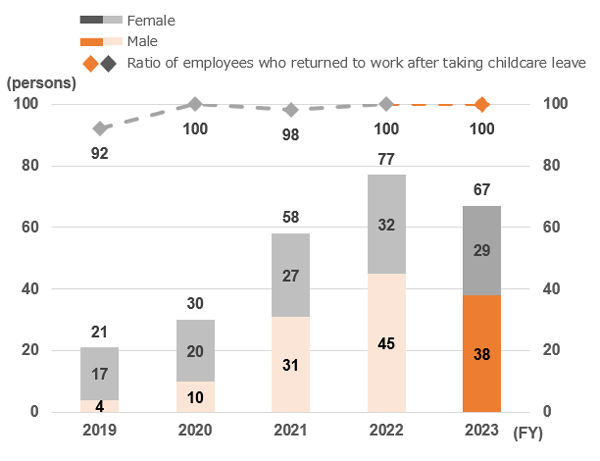
Balancing Work and Caregiving
Glory has established a nursing care leave system whereby employees are entitled to up to 365 days of leave per family member and a shortened working hour system for nursing care of up to three years.
It also has a system that allows employees to accumulate unused annual paid leave that expires after two years of receiving it and use the leave for nursing care or personal sickness and injury. These revisions help balance time for work and that spent caring for sick or elderly family members.
Reducing Long Work Hours
Glory strives to modify work processes and schedules to prevent working long hours on a routine basis. This helps to bolster mental and physical well-being and maintain work motivation.
In an effort to impress upon employees the importance of working efficiently, Glory has instituted "no-overtime days" and "no-overtime weeks". To encourage employees to go home on time, the company has limited the number of overtime hours per day. Face-to-face consultations with the industrial physician are carried out for employees who routinely work long hours in order to prevent health problems.
Labor Practices
Glory strives to conduct fair personnel evaluations based on employee capabilities and achievements and to establish sound labor-management relationships toward enriching the work environment.
Fair Evaluation and Treatment
To help both the company and its employees grow, and for clarifying the roles and responsibilities of each employee, Glory operates its "management by objective" system.
Under the system, employees meet with their supervisors semi-annually to evaluate progress against goals they defined at the beginning of each fiscal year and receive feedback.
Our Personnel System Guidebook concerning the Evaluation/Treatment/Remuneration System is made available to all employees, with the results of evaluations also disclosed to employees individually, thus increasing fairness, transparency, and credibility.
Sound Labor-Management Relationship
With the belief that maintaining a peaceful labor management relationship leads to healthy business development, Glory meets regularly with its labor union to discuss issues such as improved working conditions and management of working hours. Through open dialogue, it maintains and reinforces a healthy relationship between labor and management, encouraging both parties to grow together in harmony.
Creating Pleasant Working Environments
Improving Employee Engagement
As an initiative to improve employee engagement, we conduct annual awareness surveys for our employees including executive officers and senior employees. Topics include employee engagement, compliance, harassment, and sustainability, which are considered essential to create a great place to work.
We report the survey results to division/department heads and disclose a summary on the company's intranet. Through regular surveys, we monitor the status of employee awareness and identify emerging issues, comparing with past results. We implement countermeasures where necessary and verify its effectiveness through subsequent surveys.
FY2023 survey involved 3,547 employees with a 90% response rate, of which 42% were affirmative. We will continue our initiatives to improve employee engagement and achieve 55+% affirmative answers in surveys, which is the target set in the 2026 Medium-Term Management Plan.
Industrial Safety and Health
Glory encourages the creation of a safe, secure, and comfortable workplace environment to maintain and improve the mental and physical well-being of employees based on the Safety and Health First concept.
2025 Corporate Safety and Health Policy
Glory promotes sustainable management based on the principle of “Prioritize safety, health, and well-being”. We are committed to creating a safe and healthy workplace and promoting mind-body wellness of employees based on the following policies:
Safety and Health
- ・We provide training and make improvements where necessary to prevent work-related injuries.
- ・We comply with safety and health-related regulations as well as other requirements agreed upon by the Company.
- ・We raise safety awareness and promote workplace safety, thereby eliminating hazardous factors towards “zero hazard” beyond “zero accidents”.
- ・We work towards zero traffic accidents while on duty and commuting.
Health Management
- ・Promote initiatives in line with the Company's basic health management policy to improve productivity in daily operations.
- ・Promote mental and physical health management through annual health checks, professional health guidance, and regular stress checks.
Structure for Managing Safety and Health
To maintain and reinforce the structure for managing safety and health, Glory established the Central Safety and Health Committee, to be responsible for creating annual and mid- to long-term company-level activity plans related to safety and health as well as Safety and Health Committees at each business site for creating their own respective activity plans.
Each committee meets monthly to discuss health promoting activities, occupational accidents, including root causes, and countermeasures. The committees also provide a forum for sharing information. Members include the safety operation manager, fire prevention manager, and other managers who deal with safety and health. As a result, the committees' activities cover a wide range of topics.
Framework for Managing Safety and Health
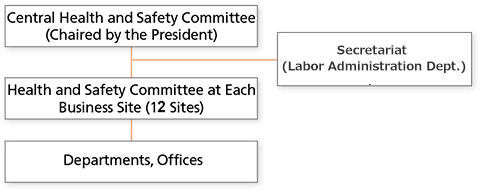
Lost Time Injury Frequency Rate
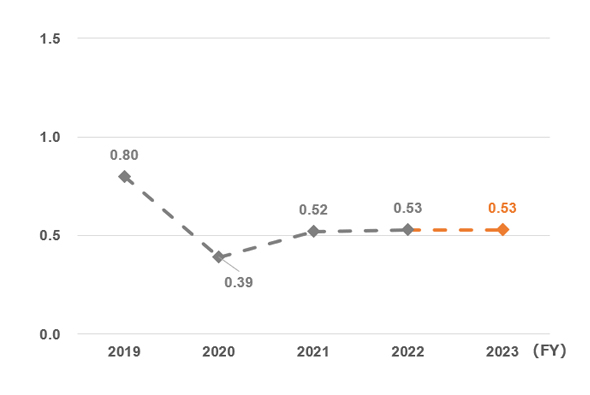
Lost Time Injury Severity Rate
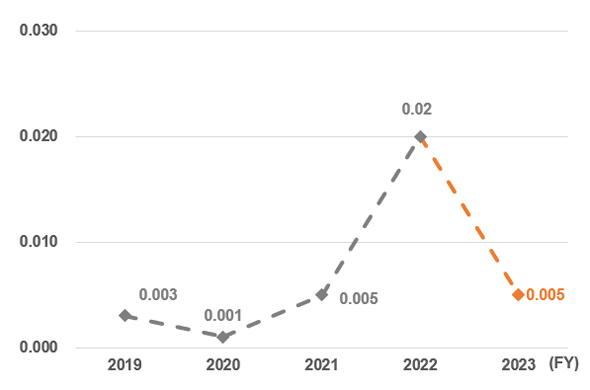
Occupational Safety and Health
At Glory, we commit ourselves to work towards zero occupational injuries or commuting accidents. At the Himeji Headquarters/Factory, all department engage in safety actions based on Glory’s safety and health management standards and conduct risk assessments to prevent workplace accidents.
Promoting Health and Productivity Management
Glory believes that maintaining employee well-being is a key management concern for corporate activities and therefore established the Health and Productivity Management Declaration to promote initiatives for maintaining employees’ health.
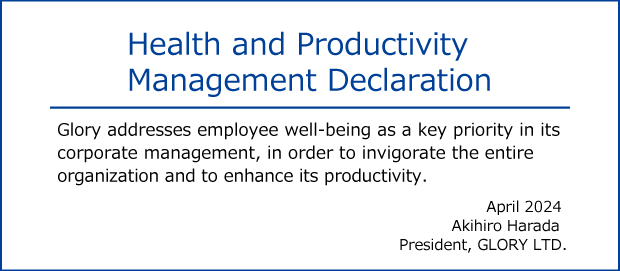
Basic Health and Productivity Management Policy
We address our Health and Productivity challenges by incorporating strategical measures into the management plan, in line with the Health Management Strategy Map shown below.
We set specific numerical targets and implement measures to raise awareness and promote the health of our employees.
We create a safe and healthy work environment and establish labor and welfare systems that reinforce the engagement, morale, and productivity of our employees, so as to reduce Absenteeism* and Presenteeism**.
*Habitual pattern of employees’ absence due to health issues.
**Act of employees continuing to work despite having reduced productivity level due to health issues.
Health and Productivity Management Strategy Map
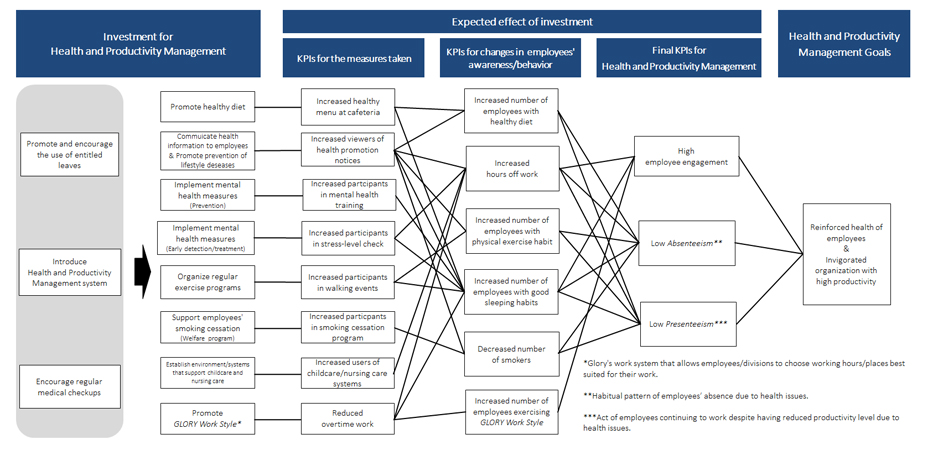
Health and Productivity Management Promotion Framework
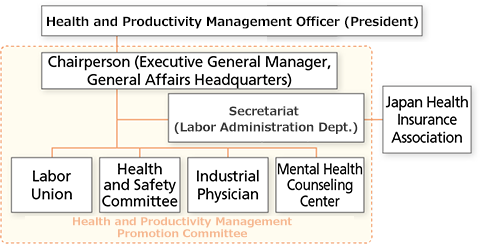
We have been conducting a health questionnaire targeting all employees every year to further promote health and productivity management since fiscal 2019, and the following actions have been implementing to address the challenges that emerged for strengthening health maintenance.
- ・To appreciate the benefits of exercise and raise awareness of physical activity
- ・To provide information on adequate eating habits
- ・To provide information on the life cycle of women and their health control
- ・To support mental health
- ・To provide health information to employees & promote prevention of lifestyle diseases.
- ・To prevent passive smoking
- ・To support smokers who wish to stop smoking
- ・To improve the consultation rate for complete medical checkups as well as medical checkups aimed at preventing lifestyle diseases
- ・To improve the rate of receiving health guidance focused on metabolic syndrome
- ・To improve the consultation rate for follow-up checkups
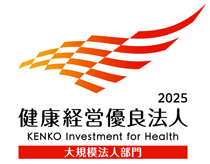
Glory has been continuously recognized as a Certified Health and Productivity Management Organization in the large enterprise category by the Certified Health and Productivity Management Organization Recognition Program operated by the Ministry of Economy, Trade and Industry and Nippon Kenko Kaigi (Japan Health Council) since 2020.
The Certified Health and Productivity Management Organization Recognition Program recognizes large enterprises and small to medium enterprises engaging in particularly outstanding health management practices based on initiatives that address health issues impacting the local community or health improvement initiatives promoted by Nippon Kenko Kaigi.
Measures to Maintain Health
Glory maintains and reinforces employee health by ensuring they receive standard medical checkups annually and, for those who are applicable, special semi-annual medical checkups. Industrial physicians and health nurses provide a follow-up based on the results of the checkups through, for example, face-to-face consultations.
As measures to help prevent mental health issues, the company established the internal Mental Health Counseling Center, which is staffed by three counsellors and conducts awareness-raising activities on mental health. The group also offers stress checks to all employees, with 86.2% taking them in fiscal 2024. The results are analyzed and necessary follow-up actions are taken which include offering face-to-face counseling with doctors and counsellors to employees identified as suffering from high stress while analyzing their organizational structure and proposing improvements to their working conditions.



